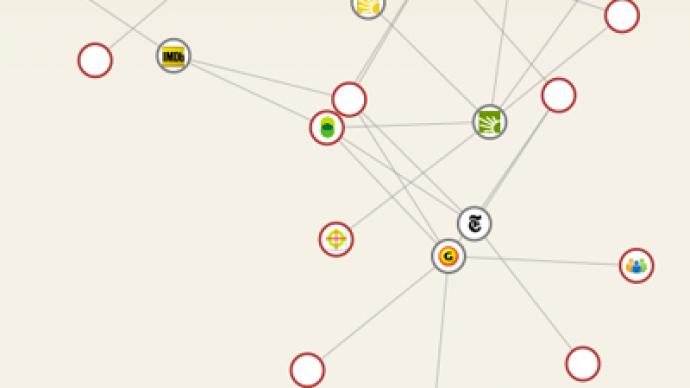Tracking the trackers: Mozilla's anti-Big Brother add-on

The owner of Firefox, the world’s second most popular browser, is backing an add-on which would allow users to monitor in real-time how their actions are tracked and shared by various websites as they surf the net.
The tool currently in development visualizes the flow of information as a meshwork of bubbles representing different websites. It tracks the sites which the user visits and also shows their known partners – ad companies, behavior profilers and other third parties. As surfing continues, a pattern emerges revealing that different popular sites are linked to the same data collectors, which are building up their knowledge on the user’s habits and preferences. The ultimate goal of those companies is to identify what kind of advertising would ring a bell with each user, and then to target them accordingly.For instance, Google’s controversial new privacy policy aims to share info on users of its various services to build more accurate advertising profiles. The policy came into effect on Thursday amid a chorus of objections from activists and officials that it violates privacy and may be illegal in some jurisdictions. Another example is Facebook, which learns about every visit to a page which has its “Like” button on it.The amount of data collected by Google, Facebook and other players less-known to the general public is astounding. But the majority of Internet users are oblivious to this fact. Mozilla’s new add-on – called Collusion – aims to change that.“Collusion will allow us to pull back the curtain and provide users with more information about the growing role of third parties, how data drives most Web experiences, and ultimately how little control we have over that experience and our loss of data,” says Mozilla CEO Gary Kovacs in his blog.Mozilla wants the users of Collusion to submit anonymized data on their surfing habits to build up a database on who tracks them and how it is done. It is intended for researchers, journalists and privacy activists who would monitor data-tracking practices and find possible abuse.The full version of Collusion will also work together with other tools like TrackerBlock to allow users to selectively hide from some trackers while allowing others to track them.














